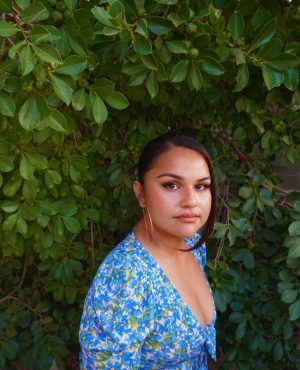Jessennya Hernandez (Sociology) is a 2022–2023 HRI Campus Graduate Student Fellow. Hernandez’s project, “Mycorrhizal Assemblages: Everyday Latinx Strategies and Embodied Feminist Knowledge,” examines the everyday lives of working-class queer immigrant Latinx women and femme political-creatives living in greater Los Angeles.
Learn more about HRI’s Campus Fellowship Program, which supports a cohort of faculty and graduate students through a year of dedicated research and writing in a collaborative, interdisciplinary environment.
What is unique about your research on this topic?
My research focuses on how working class Latinx women and femme creatives rethink urban autonomy across greater LA, outside of institutionalized politics and the neoliberal settler-colonial state. Based on my interlocutor’s practices and uses of plant knowledge, I use the subterranean networks of mycorrhizae as an orientation device to understand how these racialized creatives build communities of collective sustainability and care. Like the symbiotic webs of fungal strands (mycelium) that inhabit the root systems of plants to collect and redistribute nutrients from the soil and ensure a collective survival, I center the ways in which these queer and transnational networks of creatives nurture ways of living and knowing based in sharing resources, skills, spaces, politics, and dreams to help them meet their material and spiritual needs. While many overlook these vinyl DJs, musicians, jewelry makers, and DIY creatives, their work critically divests from Western and normative conceptions of space, time, citizenship, healing, and community.
What drives your interest in this research?
What is most interesting to me about this work is how my interlocutors find creative ways to nurture their communities and imagine a future in which we all can thrive.
“Their queer strategies and spaces are rooted in ancestral and intergenerational knowledges and traditions of critical queer BIPOC community building. This research honors these knowledges and traditions; highlights those who ensure that we remember these knowledges and give them new life; and centers sustainability and living beyond survival.”
— Jessennya Hernandez
Just as I have learned from them, I believe that others have much to learn from them as well. Through their creative work, queer spaces, and embodied knowledges they build financial interdependence, unapologetically honor their anger and trauma, build trust amongst each other, and navigate state surveillance and policing. Ultimately, what keeps me dedicated to this research are the ways in which these queer Latinx women and femmes nurture both an investment in their own daily quality of life, desires, and aspirations as well as a collective critique of the socio-political systems of violence that they must navigate. In a way, they are building smaller worlds in which they can practice self and collective determination in creative ways.
How has the fellowship seminar impacted the way you approach your research?
The brilliant fellows in this seminar have helped me to enrich and refine my theoretical concepts and analysis. For example, they have helped me to unpack the ways in which my interlocutors’ networks, like mycorrhizae, have different points of entry and are nodal, underground, inseparable, and nonlinear. Moreover, they helped me identify a larger implication of my research: understanding how people who are always already queered by the state make sense of the world, come together, and navigate a colonial system that defines them and where they come from before they’re even born.
